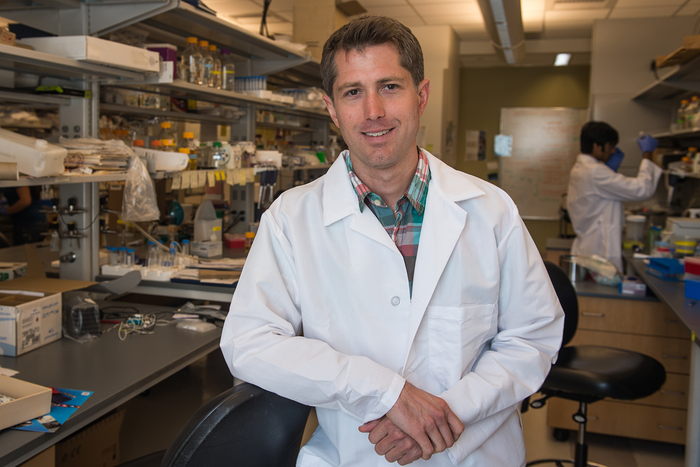HOUSTON – (May 23, 2022) – Rice University synthetic biologists and bioengineers are preparing to interrogate some single-celled survivalists to find out how they deal with stress.

Credit: Credit: Jeff Fitlow/Rice University
HOUSTON – (May 23, 2022) – Rice University synthetic biologists and bioengineers are preparing to interrogate some single-celled survivalists to find out how they deal with stress.
Bacillus subtilis is a common soil bacteria with an outsized reputation for handling stress. It’s the model organism biologists use to study spore formation, a life-or-death gamble that requires precision timing under the worst circumstances.
Synthetic biologists in the laboratory of Rice bioengineer Jeff Tabor are preparing to shine a lot of light on B. subtilis’ stressed-out decision making. Tabor’s group has spent more than a decade developing optogenetic tools to turn bacterial genes on and off with light. A new $1.3 million grant from the National Science Foundation will allow Tabor’s team to use its tools in collaboration with the lab of computational bioengineer Oleg Igoshin to decode B. subtilis’ genetic response to stress.
“Bacteria are the product of billions of years of evolution, and as a result they are programmed to survive,” said Tabor, the grant’s principal investigator and an associate professor of bioengineering. “They respond to stress in complex ways that have health and economic implications. Decoding how they respond could lead to new technological advances in synthetic biology and even to sorely needed antimicrobial drugs.”
Life is controlled by DNA-based circuits that use protein production in much the same way that electronic circuits use voltage. Just as the voltage output from an electronic circuit can be switched on or off, or dialed up or down, so too can the protein production from a genetic circuit.
Tabor’s lab has developed a suite of tools to control and study genetic circuits, and it has developed methods for programming cells to sense and respond to stimuli that have applications in medicine, biotechnology, defense and basic science. For example, Tabor’s team developed a biohacking toolkit in 2019 that allowed it to mix and match the inputs and outputs of bacterial sensory circuits, and two years later showed it could use those tools to engineer the first bacterium capable of diagnosing human disease.
In the new project, Tabor’s lab will use optogenetics to decode the activity of key regulatory proteins called transcription factors in two B. subtilis stress-response networks, showing how the “flow” of proteins through genetic circuits in the networks vary over time.
Tabor’s experimental results will be combined with Igoshin’s theoretical and computational findings. Igoshin, a co-principal investigator on the grant, is a theorist and computational systems biologist who has modeled and studied B. subtilis’ stress-response networks for years. In previous studies, Igoshin and colleagues have shown how the networks filter signal noise, use DNA replication as a timing mechanism and employ physiological cues as triggers.
“This research will reveal clues about how these pathways operate and give new insights into how bacteria survive stress,” said Igoshin, a professor of bioengineering and a senior scientist at Rice’s Center for Theoretical Biological Physics. “We also hope to uncover genetic design principles that help us better understand similar decision circuits in pathogenic bacteria.”
-30-
Grant abstract:
“Optogenetic interrogation of B. subtilis stress-response network dynamics,” National Science Foundation, Division of Molecular and Cellular Bioscience
https://www.nsf.gov/awardsearch/showAward?AWD_ID=2204402
Related stories and links:
Engineered organism could diagnose Crohn’s disease flareups – May 17, 2021
Synthetic biologists hack bacterial sensors – May 20, 2019
Rice U. unveils dual-channel biological function generator – May 8, 2017
Bacterial survival switch triggered by growth rate – May 23, 2016
Bacteria use DNA replication to time key decision – July 9, 2015
Deciphering bacterial doomsday decisions – Nov. 26, 2012
Image downloads:
https://news-network.rice.edu/news/files/2022/05/0523_TABOR-grant-JT-lg.jpg
CAPTION: Jeff Tabor (Credit: Jeff Fitlow/Rice University)
https://news-network.rice.edu/news/files/2022/05/0523_TABOR-grant-OI-lg.jpg
CAPTION: Oleg Igoshin (Photo by Jeff Fitlow/Rice University)
https://news-network.rice.edu/news/files/2022/05/0523_TABOR-grant-sub-lg.jpg
CAPTION: Fluorescent Bacillus subtilis viewed with a confocal microscope. (Photo by Fernan Federici cropped and redistributed under CC BY-NC-SA 2.0)
This release can be found online at news.rice.edu.
Follow Rice News and Media Relations via Twitter @RiceUNews.
Located on a 300-acre forested campus in Houston, Rice University is consistently ranked among the nation’s top 20 universities by U.S. News & World Report. Rice has highly respected schools of Architecture, Business, Continuing Studies, Engineering, Humanities, Music, Natural Sciences and Social Sciences and is home to the Baker Institute for Public Policy. With 4,052 undergraduates and 3,484 graduate students, Rice’s undergraduate student-to-faculty ratio is just under 6-to-1. Its residential college system builds close-knit communities and lifelong friendships, just one reason why Rice is ranked No. 1 for lots of race/class interaction and No. 1 for quality of life by the Princeton Review. Rice is also rated as a best value among private universities by Kiplinger’s Personal Finance.




